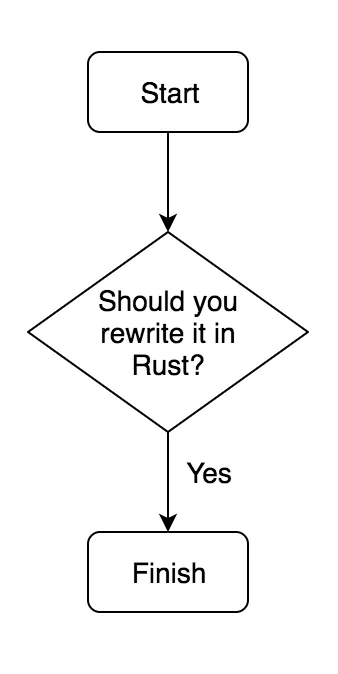Integrating rust in coreboot: baby steps
Table of Contents
Rust in coreboot?
Rust is a programming language with emphasis on performance, type safety and concurrency. It enforces memory safety at compile time. Unlike the C standard which is a 700+ page document, with a LOT of documented undefined behavior, rust has no undefined behavior unless the unsafe keyword is used. Zero cost abstractions make rust binaries very efficient in both size and execution, in places where C will have a hard time to be optimized (e.g. function pointers in structs).
When you're used to C tooling, the rust tooling is beyond any comparison:
- the compiler rustc is very good at telling you what to do when something is wrong. Compare that to
GCCthat craps out 100 error messages if you forget a semicolon - cargo is the package manager and build tool: using some cool code you found on the web is a bliss
- rustfmt: no endless discussion on how code should be formatted (max char count per line, where to place {}, comments, order of inclusion of crates/headers, …)
- clippy: linter against common mistakes, write idiomatic rust like a pro
It's just too easy!
All these things make rust very suited for firmware development. See https://docs.rust-embedded.org/book/ on how rust can shine as a bare metal language.
Linux is already integrating rust, coreboot which up until now is is mostly C, some assembly, with ADA/SPARK for Intel graphic init, should not lag behind!

First attempt
This will describe how I wrote rust code and linked it with the existing C coreboot code. The end result: C can call rust code and rust can call C code: We call a function in rust that calls coreboots printk to print something on the console.
Getting started: a static library (.a)
Rust provides a few output/linker options: bin, lib, dynlib, staticlib.
Coreboot is able to link static libraries .a files, so we need to instruct cargo to do that.
Add the following to the Cargo.toml:
[lib]
crate-type = ["staticlib"]Calling C from rust: bindgen
To call C code from rust you need to create some bindings. E.g.:
extern "C" {
pub fn cool_function(
i: cty::c_int,
c: cty::c_char,
cs: *mut CoolStruct
);
}Doing this manually for all the functions in C we want to call could be a lot of work. Luckily a tool exists
than can parse C headers into rust code we need: bindgen. Normally you set up bindgen in the build.rs to output
the bindings, but for testing purposes I used to CLI version.
I want to call printk to see my rust code executing, so I use bingen on console.h and include enough CPP args to make it work.
bindgen --use-core --with-derive-default --ctypes-prefix core::ffi src/include/console/console.h \
-- -Isrc/commonlib/include -Isrc/include -Isrc/commonlib/bsd/include -include src/include/kconfig.h -Ibuild -DENV_RAMSTAGE=1Calling rust from C
Now that we have our automatically generated C bindings in place we can implement a function that calls it.
#[no_mangle]
pub extern "C" fn hello_rust() {
let string: &[u8] = b"Hello, world in rust!\n\0";
unsafe {
bindgen::printk(
bindgen::BIOS_INFO.try_into().unwrap(),
string.as_ptr().cast(),
);
}
}#[no_mangle] has the compiler generate symbols without mangling their names.
That way the linker can find the symbol by name and C code can call it.
Next we need to include the .a file and call our hello_rust function.
Simply move the .a file in the q35 mainboard directory and add the following to the Makefile.inc.
all-y += libcoreboot_rs.a
Next add a function call in C code in the ramstage (mainboard.c):
void hello_rust(void);
printk(BIOS_ERR, "Calling Rust code\n");
hello_rust();
printk(BIOS_ERR, "Called Rust code\n");Panic!!
Let's skip that for now. Add the following to Cargo.toml
[profile.dev]
panic = "abort"Compatible compiler target
Now the linker will complain: our code is compiled for userspace. There are a lot of symbols not found, since coreboot is not a userspace program.
We need to use a different target for bare metal rust. Looking at the support page
it looks like x86_64-unknown-none would a good target for bare metal x86 which implies for now
that I need to use 64bit coreboot (no such target for 32bit).
You can set the target the following way:
cargo build --target x86_64-unknown-noneThis still results in the linker complaining about using illegal linker symbol relocation types: Type 9 and type 11.
According to the AMD64 ABI documentation those are R_X86_64_GOTPCREL and R_X86_64_32S.
GOTPCREL generally means we're trying to generate position independent code.
32S means we're using the wrong memory model.
To fix that we need to define a new target that has those compiler options correctly set.
New targets are added using json files and used by referencing that json file with that --target cargo option.
After messing around I settled on the following which linked with coreboot.
{
"llvm-target": "x86_64-unknown-none",
"target-endian": "little",
"target-pointer-width": "64",
"target-c-int-width": "32",
"data-layout": "e-m:e-p270:32:32-p271:32:32-p272:64:64-i64:64-f80:128-n8:16:32:64-S128",
"arch": "x86_64",
"os": "none",
"env": "",
"vendor": "unknown",
"linker-flavor": "gcc",
"target-family": "oreboot",
"pre-link-args": {
"gcc": ["-m64", "-nostdlib", "-static"]
},
"features": "-mmx,-sse,-sse2,-sse3,-ssse3,-sse4.1,-sse4.2,-3dnow,-3dnowa,-avx,-avx2,+soft-float",
"dynamic-linking": false,
"executables": false,
"relocation-model": "static",
"code-model": "large",
"disable-redzone": true,
"eliminate-frame-pointer": false,
"exe-suffix": "",
"has-rpath": false,
"no-compiler-rt": true,
"no-default-libraries": true,
"position-independent-executables": false,
"has-elf-tls": true
}After some digging on stackoverflow I managed to get the same thing working for 32bit, even though 32bit x86 bare metal is not officially supported:
{
"llvm-target": "i686-unknown-none",
"data-layout": "e-m:e-i32:32-f80:128-n8:16:32-S128-p:32:32",
"arch": "x86",
"target-endian": "little",
"target-pointer-width": "32",
"target-c-int-width": "32",
"os": "none",
"dynamic-linking": false,
"relocation-model": "static",
"executables": false,
"linker-flavor": "ld.lld",
"linker": "rust-lld",
"panic-strategy": "abort",
"disable-redzone": true,
"features": "+soft-float,-sse"
}As we use custom targets we need to recompile rust core libraries:
cargo build --release --target i686-unkown-none-coreboot.json -Zbuild-std=core,allocWhat is next?
Panic handler
Not much to say. It's worth implementing a real one :-)
Port Linux printk
The way Linux integrated rust to print on the same console is the following.
In the printk implementation there is a special format specifier %pA which is handled by
calling rust code. To print things on the console Linux implements rust print functions
that call printk using that format specifier. This way the powerful rust formatting can be used.
Hook up build system cleanly
- Hook up
bingentobuild.rsto properly generate buildings. - Add a makefile target to generate the archive by calling cargo with the proper json target file.
What to (re)implement in rust?

So this blog post demonstrated that integrating rust code with C is not hard. It's also very easy to replace parts of existing C code with rust seamlessly. It was a design goal of rust after all. Now the question remains: what should be written in rust inside the coreboot tree? I don't have a good answer to that question.
SMI handler
This is the only runtime that coreboot leaves behind. Given how security critical SMM code is (gaining code execution of SMM allows to bypass any security mechanism the OS has in place without anyone noticing), this seems like a good place to start.
Coreboot's C smihandler code is pretty slim compared to UEFI, which reduces the attack surface. It still remains a nasty place for bugs and they are bound to exist with C code. The small size of the smihandler also makes it a realistic target for a rust rewrite.